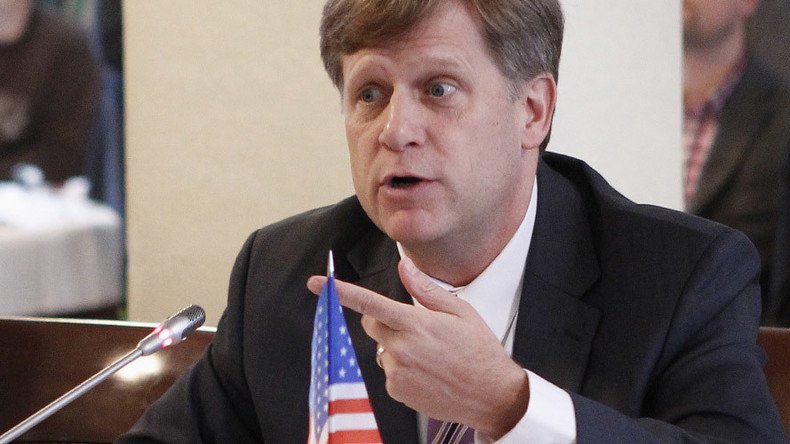McFaul’s Follies: One failed diplomat’s misguided attempt to destroy Russia-US relations

Michael McFaul's suggestion that RT journalists be designated as 'foreign agents' in the United States crossed a line. By doing so, he targeted a lot of real professionals and threatened press freedom.
Nobody seems able to agree on whether P.T. Barnum or Walt Disney popularized the phrase “always leave them wanting more.” It doesn’t really matter whether it was the creator of Mickey Mouse or the architect of the “museum of freaks.”
Regardless of its provenance, quite a few pundits on the Russia beat would do well to heed the expression. None more so than Michael McFaul, who appears in almost every popular press critique of the Kremlin these days. In fact, America’s former ambassador to Moscow is so thinly spread right now he’s fast becoming the 'Porcelain Prince' of the Russia cognoscente. Over-exposed and with skeletal arguments, based on emaciated facts.
So much so, Russia watchers have been asking: “Does Michael McFaul ever sleep?” And it now appears they might be onto something because the failed diplomat is showing signs of the kind of delirium which is often a telltale sign of slumber deprivation. His latest brain fart is truly astonishing. Amazingly, McFaul has taken to the pages of the - increasingly hysterical and McCarthyist - Washington Post to suggest how employees of RT should be classed “as foreign agents under the Foreign Agents Registration Act.” He’s stuck a question mark on the end, to leave himself some wriggle room. But even the snake-like punctuation symbol is no stumper here.
I dont know the truth about foreign involvement in our elections. I want the American people to know. #FactsMatter. https://t.co/uLjcKjSyHX
— Michael McFaul (@McFaul) December 11, 2016
Clever clogs
McFaul should, and certainly does, know better. And his Twitter praise of RT’s chief editor, Margarita Simonyan, for her “fantastic job in the service of the Russian state” is further proof of the duplicitous strategy at play here. Because it’s clear how these attempts to install a narrative that RT is solely serving the Kremlin, are designed to leave American staff of this network in an impossible position. Despite the gormless veneer, the shameless professor is playing a shrewd game. One old Joe McCarthy himself would have greeted with relish.
As there’s no mention of similarly foreign state-funded outlets like BBC, Al Jazeera or France 24, all of which also operate in the US, it’s clear how the target is to scare American journalists away from working for RT. Now, while it may be water off a duck’s back to a veteran like Larry King, it has serious implications for a young reporter.
Not to mention, the repercussions for Russian citizens employed by Western news organizations. You see, the US has its own version of RT, called Voice of America and its own Sputnik too, Radio Free Europe/Radio Liberty. Both of these began life as CIA cut-outs, and they continue to be generously funded. Indeed their parent, the BBG, has a budget around three times larger than RT. Oh, and if you’ve never heard of them, don’t despair because you really aren’t missing much. But it might be worth looking at their charter, which insists they must "be consistent with the broad foreign policy objectives of the United States."
Obviously, any attempt to restrict Russian media’s freedom to operate in America would have knock-on consequences for US equivalents here. And from speaking to Kremlin officials, it’s clear how it could also extend to private broadcasters and publications, given the imbalance in penetration. In the sense that, while almost every major US entity has a Moscow correspondent, the inverse is not the same. Thus, it’s clear how this insensitive and dunderheaded punditry can make a lot of honest professionals feel very insecure.
Fake news
Another problem with McFaul’s supposition is where he attempts to convince readers how RT “campaigned openly for one candidate, Donald Trump.” Put plainly; this is nonsense. Because if the network was guilty of favoring a US politician in recent times, it’s probably Jill Stein or Bernie Sanders, both of whom engaged with the channel frequently. As did their supporters. Also, on a personal note, I talk to RT employees very often, and none have exhibited any profound delectation over Trump’s success, but quite a few expressed a fondness for ‘Bernie.’
All this is important in the context of an article headed “let’s get the facts right.” So is the manner in which McFaul informs us how “we know that Russian actors stole data from people working at the Democratic National Committee.” But we don’t “know” if it’s true. And McFaul provides no evidence for it. Even ignoring how WikiLeaks chief Julian Assange has clearly stated how he didn’t obtain the DNC files from Russian sources. As a result, it’s reasonably likely that the entire column is based on some dreaded “fake news.” And this is certainly not something to be singing an aria about.
And you’d think McFaul would have learned his lesson on making stuff up after WaPo used his comments to stand up the infamous “PropOrNot” piece which smeared around 200 media outlets as being agents of Russian influence? Only a few weeks ago, to boot. Indeed, his own erroneous statement that RT tweeted out a “crooked Hillary” hashtag on social media has already been corrected by the newspaper.
He's everywhere
That said, despite how our subject seems to have made more TV appearances recently than Leonardo Di Caprio on an Oscar promotion push, there are probably plenty of people passing through life without knowing much about him. So, here are the basics which he probably wouldn’t dispute. McFaul is a big fan of “democracy promotion” and a longtime “Russia hand.” While the ever-dwindling band of Russian liberals regards him as a force for good, the Russian establishment dislikes him immensely.
In late 2011, President Obama nominated him as US ambassador to Moscow. And he was barely installed before controversy began. Speaking to Russian journal ‘Slon,’ he said: “I'm an expert on democracy and anti-dictatorship movements for revolution. And when I came to the USSR in 1989, it happened to be during such a movement. And when I lived in Moscow, from 1990-1991, I became very close with the Russian democrats. It was, perhaps, the best time of my life.” As these comments came a few months after US officials had supported the “Bolotnaya protests” they went down like a lead balloon in the Kremlin.
Around the same time, McFaul invited liberal opposition activists to the US embassy, which created a further outcry. Subsequently, his ambassadorship vacillated between the mediocre and the contemptible until he “resigned for family reasons" in early 2014, as Ukraine burned. While Dmitry Medvedev had cut him some slack, Vladimir Putin’s return to the Russian Presidency left him cornered. McFaul’s perceived closeness to Hillary Clinton would have been bad enough, but his fervent support for Kiev’s 2004 “Orange Revolution” didn’t help either.
Back to the idea of labeling RT employees as 'foreign agents.' As a journalist, I am absolutely appalled by McFaul’s suggestion. It is consistent with the most abhorrent elements of McCarthyism and reincarnates a specter that once seemed restricted to history books. I’m also tired of McFaul appearing in almost every article collated by Johnson’s Russia List, a listicle that all “Russia watchers” of any standing digest daily. Because he’s manifestly the most obstinate, whiny, irascible, attention seeking windbag on a beat which boasts some of the most delicate, hypersensitive and thin-skinned folk who ever breathed. And if he blocks me on Twitter for this I don’t care.
Footnote - I asked McFaul on Sunday the following question: “So, Michael, should Russian journalists working for @RFERL & @BBCNews register as 'foreign agents' in Russia. With all that implies?”
So, Michael, should Russian journalists working for @RFERL & @BBCNews register as "foreign agents" in Russia. With all that implies? https://t.co/Hjd1plgOzp
— Bryan MacDonald (@27khv) December 11, 2016
He ignored it. Later, he claimed how “lots of US reporters (sic) being denied visas to Russia.” I queried “Could you name one, Michael? It's unusual that journalists would stay so quiet about something like this?”
This time, he did respond:
“I know three, all playing it quiet, trying to get off the list. Head of BBG, of course, was denied entry and that was public.” My reply was “Is Jeff Shell (BBG chief) a journalist? I asked you to name a journalist who has been refused (a) visa (say in last 12 months). Can you? Is (sic) very newsworthy.” Some thirty hours later, there has been no answer.
Is Jeff Shell a journalist? I asked you to name a journalist who has been refused visa (say in last 12 months). Can you? Is very newsworthy https://t.co/XreEGgiyxu
— Bryan MacDonald (@27khv) December 12, 2016
Also, just for clarity's sake, I am referring to entry visas, not press accreditation. The latter is a problem for bloggers and online video hosts in many countries, who still regard media as restricted to newspapers, magazines, television and radio. Including Russia. As an aside, on my own last trip to America, I had to give an assurance that I wouldn't engage in journalistic activity while there. The alternative was the refusal of admittance.
But I guess I was one of the lucky ones. Because, according to Slate, around that time "at least 15 journalists from FRIENDLY countries have been forcibly detained, interrogated, fingerprinted, and held in cells overnight (in the US)—with most denied access to phones, pens, lawyers, or their consular officials." Indeed, one of those dangerous hacks was there to interview Olivia Newton-John. Making them clearly a threat to national security.
The statements, views and opinions expressed in this column are solely those of the author and do not necessarily represent those of RT.














